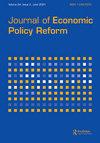社会经济水平、邻里隔离和互惠决定因素:使用拉丁美洲城市代表性人工数据的证据
IF 3.2
3区 经济学
Q1 DEVELOPMENT STUDIES
引用次数: 1
摘要
我们研究城市隔离是否与社会资本有关,特别是社会经济水平是否不利于互惠的形成。我们采用了六个拉丁美洲城市的代表性数据,这是一个实验研究中代表性不足的地区。我们的主要研究结果提供了强有力的证据,表明与社会经济水平较低的参与者相比,社会经济水平较高的个体越来越多地奖励更高水平的信任。本文章由计算机程序翻译,如有差异,请以英文原文为准。
Socio-economic level, neighborhood segregation and determinants of reciprocity: evidence using representative artefactual data from Latin American cities
ABSTRACT We study whether urban segregation is linked to social capital and, in particular, whether socio-economic level, measured by neighborhood of provenance, is detrimental to the formation of reciprocity. We employ representative data for six Latin American cities, an underrepresented region in terms of experimental research. Our main findings provide robust evidence that individuals with higher socio-economic level increasingly reward larger levels of trust in comparison to lower socio-economic level participants.
求助全文
通过发布文献求助,成功后即可免费获取论文全文。
去求助
来源期刊

Journal of Economic Policy Reform
Multiple-
CiteScore
6.60
自引率
0.00%
发文量
14
期刊介绍:
The Journal of Economic Policy Reform focuses on the analysis of economic policy reform. The journal draws upon what lessons can be learned from the successes and failures of countries undertaking reforms and how existing theories can be developed to shed light on positive as well as normative aspects of the reform process. The Journal of Economic Policy Reform encourages work from economists and political economy analysts on policies to promote growth and reduce poverty, intellectual property rights, aid versus trade, debt and debt relief, taxation and social security systems, surveys of key reform issues, as well as on corruption, democracy, emerging markets and the role of multilateral institutions.
 求助内容:
求助内容: 应助结果提醒方式:
应助结果提醒方式:


